

The Best Music for Writing, Reading, and Studying – StudySuccessful. This is a guest post by the writing team of BusinessInsuance, if you would like to feature a guest post send me an email!

I know. Not everyone prefers listening to music while studying or reading or writing or creating art or whatever. But I think most of us can agree that it’s nice to have music around for activities like these. They can help set a pace for your project, break up the monotony, and (in their greater moments) inspire us. Of course, not all music provides the optimal environment or setting for creating or digesting words and ideas. Sigur Rós What music is better for working and proving something of yourself than an epic dream-like post-rock band from Iceland that uses a hybrid of Icelandic and English and bowstrings on their guitars?
73 Ways to Become a Better Writer. 25 Insights on Becoming a Better Writer. When George Plimpton asked Ernest Hemingway what the best training for an aspiring writer would be in a 1954 interview, Hem replied, “Let’s say that he should go out and hang himself because he finds that writing well is impossibly difficult.
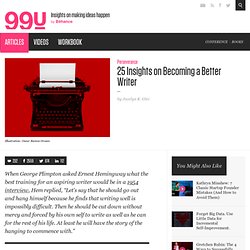
Then he should be cut down without mercy and forced by his own self to write as well as he can for the rest of his life. At least he will have the story of the hanging to commence with.” Today, writing well is more important than ever. Far from being the province of a select few as it was in Hemingway’s day, writing is a daily occupation for all of us — in email, on blogs, and through social media. It is also a primary means for documenting, communicating, and refining our ideas.
So what can we do to improve our writing short of hanging ourselves? 1. Don’t just plan to write—write. 2. [The] Resistance knows that the longer we noodle around “getting ready,” the more time and opportunity we’ll have to sabotage ourselves. (More) tips for writing well (Austin Govella at Thinking and Making) Published Wed, Jul 8, 2009 by Austin Govella.
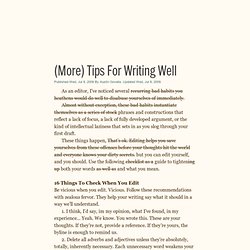
Updated Wed, Jul 8, 2009. As an editor, I’ve noticed several recurring bad habits you heathens would do well to disabuse yourselves of immediately. Almost without exception, these bad habits instantiate themselves as a series of stock phrases and constructions that reflect a lack of focus, a lack of fully developed argument, or the kind of intellectual laziness that sets in as you slog through your first draft.
These things happen, That’s ok. Editing helps you save yourselves from these offenses before your thoughts hit the world and everyone knows your dirty secrets. but you can edit yourself, and you should. 16 things to check when you edit Be vicious when you edit. 23 (More) Websites that Make Your Writing Stronger - StumbleUpon. 5 editor’s secrets to help you write like a pro. I do a lot of copyediting, both of books and advertising collateral.
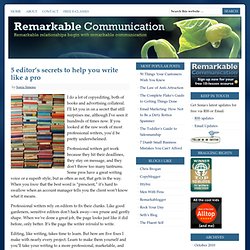
I’ll let you in on a secret that still surprises me, although I’ve seen it hundreds of times now. If you looked at the raw work of most professional writers, you’d be pretty underwhelmed. Professional writers get work because they hit their deadlines, they stay on message, and they don’t throw too many tantrums. Some pros have a great writing voice or a superb style, but as often as not, that gets in the way.
When you know that the best word is “prescient,” it’s hard to swallow when an account manager tells you the client won’t know what it means. Professional writers rely on editors to fix their clunks. Editing, like writing, takes time to learn. 1. Have you ever heard a four-year-old run out of breath before she can finish her thought? Resolve to Be a More Productive Writer (Happy New Year) 11 Goal Hacks: How to Achieve Anything — PsyBlog - StumbleUpon.
Goal-setting research on fantasising, visualisation, goal commitment, procrastination, the dark side of goal-setting and more… We’re all familiar with the nuts and bolts of goal-setting.
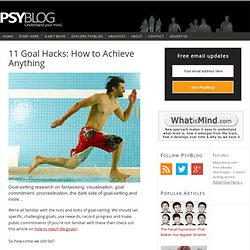
We should set specific, challenging goals, use rewards, record progress and make public commitments (if you’re not familiar with these then check out this article on how to reach life goals). So how come we still fail? This psychological research suggests why and what mindsets should help us reach our goals. 1. The biggest enemy of any goal is excessive positive fantasising. 2. The reason we don’t achieve our goals is lack of commitment. One powerful psychological technique to increase commitment is mental contrasting. 3. You can use the Zeigarnik effect to drag you on towards your goal. What the Zeigarnik effect teaches is that one weapon for beating procrastination is starting somewhere…anywhere. A new tip for productivity. As a homeschooling mom, I do all my planning for the week on Sundays.
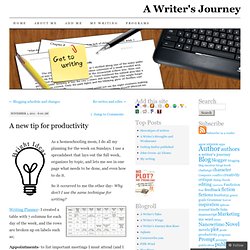
I use a spreadsheet that lays out the full week, organizes by topic, and lets me see in one page what needs to be done, and even how to do it. So it occurred to me the other day- Why don’t I use the same technique for writing? Writing Planner- I created a table with 7 columns for each day of the week, and the rows are broken up on labels such as;
» 9 Ways to Find the Time to Write. How to Write a Novel Using the Snowflake Method.